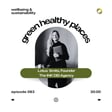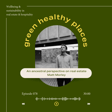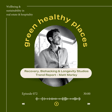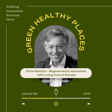
future-proof real estate with the smart building collective
Welcome to episode 063 of the Green & Healthy Places podcast in which we discuss the themes of wellbeing and sustainability in real estate and hospitality.
I’m your host, Matt Morley of Biofilico wellness real estate and in this episode we’re in Amsterdam talking to Nicholas White, Co-Founder and Managing Partner of the Smart Building Collective, a smart building and prop-tech business with its own certification framework focused on leveraging technology to measure how a real estate asset is performing.
It covers key metrics such as the building usage, its performance, the building environment, health and safety, user behavior and connectivity.
We discuss how a smart tech is at the heart of both sustainable green buildings and healthy buildings nowadays, as well as playing a role in real estate ESG strategies.
We also look at some of the more innovative real estate developments that he’s been a part of recently that give a sense of where the world of adaptable, smart and future-proof buildings are going.



















